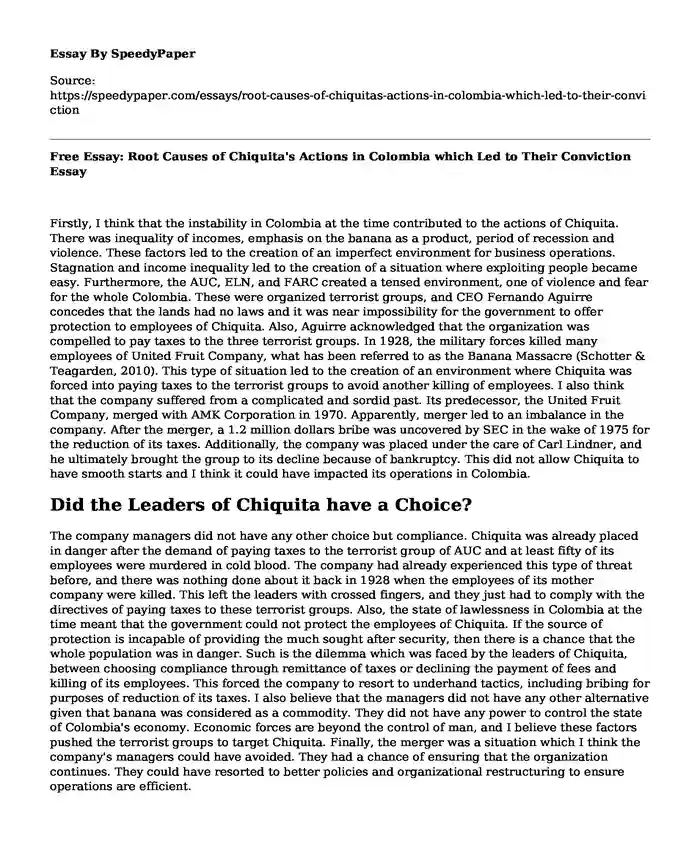Firstly, I think that the instability in Colombia at the time contributed to the actions of Chiquita. There was inequality of incomes, emphasis on the banana as a product, period of recession and violence. These factors led to the creation of an imperfect environment for business operations. Stagnation and income inequality led to the creation of a situation where exploiting people became easy. Furthermore, the AUC, ELN, and FARC created a tensed environment, one of violence and fear for the whole Colombia. These were organized terrorist groups, and CEO Fernando Aguirre concedes that the lands had no laws and it was near impossibility for the government to offer protection to employees of Chiquita. Also, Aguirre acknowledged that the organization was compelled to pay taxes to the three terrorist groups. In 1928, the military forces killed many employees of United Fruit Company, what has been referred to as the Banana Massacre (Schotter & Teagarden, 2010). This type of situation led to the creation of an environment where Chiquita was forced into paying taxes to the terrorist groups to avoid another killing of employees. I also think that the company suffered from a complicated and sordid past. Its predecessor, the United Fruit Company, merged with AMK Corporation in 1970. Apparently, merger led to an imbalance in the company. After the merger, a 1.2 million dollars bribe was uncovered by SEC in the wake of 1975 for the reduction of its taxes. Additionally, the company was placed under the care of Carl Lindner, and he ultimately brought the group to its decline because of bankruptcy. This did not allow Chiquita to have smooth starts and I think it could have impacted its operations in Colombia.
Did the Leaders of Chiquita have a Choice?
The company managers did not have any other choice but compliance. Chiquita was already placed in danger after the demand of paying taxes to the terrorist group of AUC and at least fifty of its employees were murdered in cold blood. The company had already experienced this type of threat before, and there was nothing done about it back in 1928 when the employees of its mother company were killed. This left the leaders with crossed fingers, and they just had to comply with the directives of paying taxes to these terrorist groups. Also, the state of lawlessness in Colombia at the time meant that the government could not protect the employees of Chiquita. If the source of protection is incapable of providing the much sought after security, then there is a chance that the whole population was in danger. Such is the dilemma which was faced by the leaders of Chiquita, between choosing compliance through remittance of taxes or declining the payment of fees and killing of its employees. This forced the company to resort to underhand tactics, including bribing for purposes of reduction of its taxes. I also believe that the managers did not have any other alternative given that banana was considered as a commodity. They did not have any power to control the state of Colombia's economy. Economic forces are beyond the control of man, and I believe these factors pushed the terrorist groups to target Chiquita. Finally, the merger was a situation which I think the company's managers could have avoided. They had a chance of ensuring that the organization continues. They could have resorted to better policies and organizational restructuring to ensure operations are efficient.
What can be done to restore the competitiveness of Chiquita?
The current CEO Fernando Aguirre faces the upheaval task of positioning the organization towards a more positive direction and escaping the negative administrative heritage and legacy that continues to face the company. To restore the reputation and ensure the future competitiveness of Chiquita, Aguirre has to ensure there is transparency of the organization to the public. This will make sure people are comfortable, safe and support the company by buying its products. Aguirre should also show that Chiquita is determined by its core values of respect, integrity, responsibility, and opportunity. Aguirre should revamp these values to explain to the public that they are developing a more ethical approach. Aguirre should also consider compensation of Colombians affected by the finding of the terrorist groups who meted out violence. This is an indication of the remorse for any actions undertaken by Chiquita doing the business period. Chiquita should affirmatively state that it willingly provided information relating to payments to terrorist to the state and cooperated throughout the investigation process. Moreover, the organization has to restate that it is a new dawn for them and that all personnel involved in the making of payments to terrorists is no longer an employee of the company. However, if there are some of these facilitators working for the company still, they should be relieved of their duties to provide the company with the chance of a fresh start. Aguirre needs to give the public an image of a fresh start and a dedication to ethics and morals which govern organizations. Minus realizing these, Chiquita and Aguirre have minimal chances of being relevant and competitive in the future.
Reference
Schotter, A., & Teagarden, M. (2010). Blood Bananas: Chiquita in Colombia. Arizona: Thunderbird School of Global Management.
Cite this page
Free Essay: Root Causes of Chiquita's Actions in Colombia which Led to Their Conviction. (2022, Mar 09). Retrieved from https://speedypaper.net/essays/root-causes-of-chiquitas-actions-in-colombia-which-led-to-their-conviction
Request Removal
If you are the original author of this essay and no longer wish to have it published on the SpeedyPaper website, please click below to request its removal:
- Free Essay about Informatics and Computing
- Treatment of Schizophrenia - Essay Example
- Teaching Essay Sample: Thematic Unit Lesson Plan
- Free Essay Example on the Business Case Study
- Essay Sample on Teaching and NAEYC List of Standard
- Assessment 2: Basic Descriptive Statistics
- Achieving Company Goals: Business Factors & Competitive Advantage - Essay Sample
Popular categories





